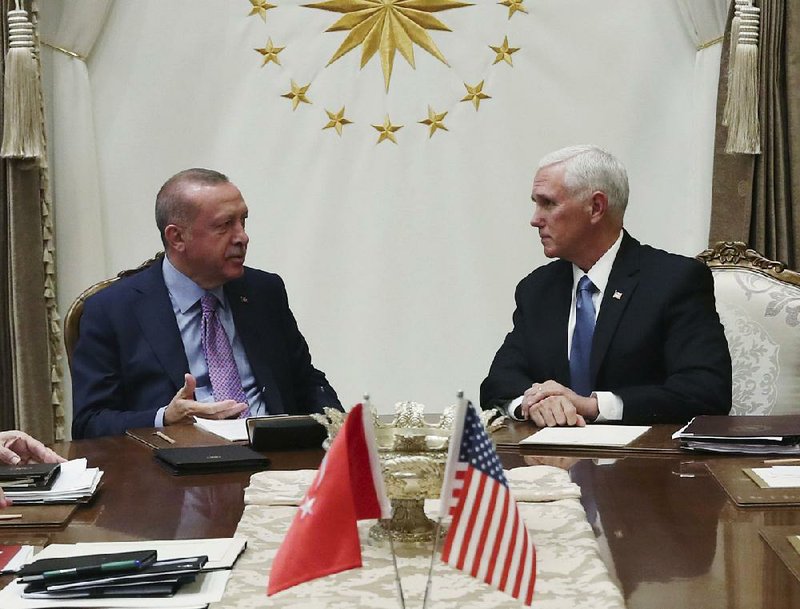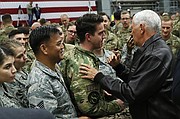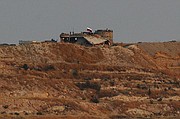ISTANBUL -- Vice President Mike Pence said Thursday that Turkey had agreed to a cease-fire in Syria, more than a week after the government of President Recep Tayyip Erdogan launched an offensive against Syrian Kurdish fighters who had previously allied with the United States.
Pence, speaking after hours of meetings at the presidential palace with Erdogan and other Turkish officials, said that Turkey had agreed to pause its offensive for five days while the United States helped facilitate the withdrawal of Kurdish fighters from a large swath of territory that stretched from Turkey's border nearly 20 miles into Syria.
After the completion of the withdrawal, Turkey's military operation would be "halted entirely," Pence said. The United States had already been in contact with the Syrian Kurdish militias, known as the Syrian Democratic Forces, and "we have already begun to facilitate their safe withdrawal," Pence added.
President Donald Trump's administration had also agreed not to impose any new economic sanctions on Turkey, and to withdraw sanctions that were imposed earlier this week once "a permanent cease-fire was in effect," Pence said.
The agreement, aimed at separating hardened foes in a volatile area of Syria, faced obvious obstacles. But it averted, at least temporarily, the most serious dispute between Turkey and the United States in years. And, on paper at least, it provided Erdogan with much of what he was seeking, including the removal of Syrian Kurdish militias from the border as well as the threat of crippling sanctions, a specter that had hovered over Turkey's vulnerable economy.
[Video not showing up above? Click here to watch » https://www.youtube.com/watch?v=gt0VXtu-w3g]
Trump had faced harsh criticism from stalwart Republican allies over the Turkish offensive, and for the perception that he had signaled his approval to Erdogan before the military operation began. "I didn't know it was going to work out this quickly, I didn't know it was going to work out this well," he told reporters on Thursday in Texas, after Pence's announcement.
"It's a great day for the United States, it's a great day for Turkey," he said. "A great day for the Kurds, it's a great day for civilization, a great day for civilization," he added.
Turkish Foreign Minister Mevlut Cavusoglu said the United States had accepted the idea of a "safe zone" long pushed by Turkey, and he insisted Turkish armed forces will control the zone. He also made clear that Turkey will not stop at a previously limited zone; he said Turkish control of the Syrian side of the border must extend all the way to the Iraqi border.
The commander of Kurdish-led forces in Syria on Thursday said they will abide by a cease-fire agreement. But his comments suggested a smaller "safe zone" than Ankara has demanded.
Mazloum Abdi, speaking on Kurdish Ronahi TV, said the extent of the cease-fire stretches about 60 miles along the middle of the border -- between the towns of Tal Abyad and Ras al-Ayn. That is the region where Turkey has largely made its gains in nine days of fighting.
"We hope that this cease-fire will be successful, and we will do our best to make it successful," Abdi said Thursday, describing it as a "tentative agreement." Abdi is also known by his nom de guerre, Mazloum Kobani.
Abdi also did not specify that his fighters would withdraw from any territory. Kurdish fighters have already been driven out of much -- but not all -- of the area he defined. But they are still entrenched in Ras al-Ayn, fiercely battling Turkish-backed Syrian fighters trying to take the town. Whether the Kurdish fighters pull out of Ras al-Ayn will likely be an early test of the accord.
Abdi made sure to praise Trump in his comments, saying "the president of the United States was directly involved and online."
He suggested the Kurdish-led force was involved in working out the cease-fire deal. "It has been three days that we have been working on this," he said. "We were aware of all details. As result we reached this agreement."
VP'S MISSION
Pence's whirlwind trip to Turkey came just a week after the start of a military operation that had hastened a withdrawal of U.S. troops and led to dire warnings about the resurgence of the Islamic State militant group as the fighting worsened.
And the Trump administration was chastised for abandoning its own allies: the Syrian Kurdish militias who partnered with the U.S. military to fight the Islamic State.
Before Thursday's breakthrough, Erdogan had repeatedly rebuffed appeals for a cease-fire and chided Western allies for suggesting he negotiate with "terrorists," as he refers to the Syrian Kurdish militias because of their links with the Kurdistan Workers' Party, which has fought an insurgency in Turkey for decades.
Pence's mission came a day after the White House made public a letter Trump had sent to Erdogan on Oct. 9 urging the Turkish leader to make a deal with the Syrian Kurds.
"You don't want to be responsible for slaughtering people," Trump wrote, concluding: "Don't be a tough guy. Don't be a fool!" The letter was written on the day Turkey's military operation started.
Turkish officials told the BBC and other news outlets Thursday that Erdogan threw the letter in the trash.
"But the most clear answer to the letter that was written on Oct. 9 was the Peace Spring Operation," CNN Turk reported, citing diplomatic sources and using Turkey's code name for its offensive.
Leading U.S. lawmakers were less pleased with the cease-fire agreement.
Sen. Mitt Romney of Utah, the Republicans' presidential nominee in 2012, said he welcomed the cease-fire but wanted to know what America's role in the region would be and why Turkey was facing no consequences for its invasion.
"Further, the cease-fire does not change the fact that America has abandoned an ally," he said on the Senate floor.
Sen. Lindsey Graham, R-S.C., a Trump confidant who has criticized the president's pullout, said he thinks U.S. troops will be needed as part of an effort to implement and enforce a halt to the fighting. "There's just no way around it," he said. "We need to maintain control of the skies" and work with the Kurds.
While the cease-fire seemed likely to temporarily slow legislation in Congress aimed at punishing Turkey and condemning Trump's U.S. troop withdrawal, lawmakers gave no sign of completely dropping the measures.
Shortly before the announcement of the pause in hostilities, Graham and Sen. Chris Van Hollen, D-Md., introduced legislation that would bar U.S. military aid to Turkey, seek to curb foreign arms sales to Ankara and impose sanctions on top Turkish officials unless Turkey withdraws its forces.
Those sanctions would include a report on Erdogan's family assets.
Information for this article was contributed by Kareem Fahim and Colby Itkowitz of The Washington Post; and by Robert Burns, Zeke Miller, Deb Riechmann, Alan Fram, Darlene Superville, Lolita C. Baldor, Jill Colvin, Kevin Freking, Ellen Knickmeyer, Lefteris Pitarakis, Bassem Mroue, Mehmet Guzel, Sarah El Deeb and Salar Salim of The Associated Press.
A Section on 10/18/2019


